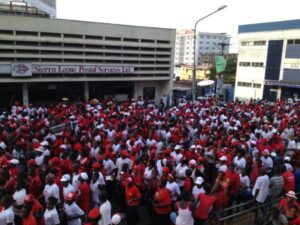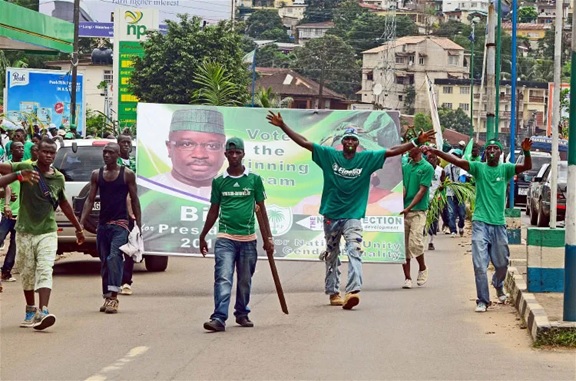Sierra Leoneans are stunned and shocked by a PPRC (Political Parties Regulation Commission) ban on rallies for the June 24, 2023 multi-tier elections. The ban to a large extent is untravires (outside the law) as the law recognise the right to assemble and associate. Going strictly by the ban, it will be difficult for political parties especially the main opposition to move or to even converge at a particular point to do the campaigning.
Despite tough feedback and backlash from the public, the PPRC Chief, Abdulai Massiande Bangura remains focused on enforcing the ban. In what appears a sinister cover up of PPRC’s arbitrariness, Bangura always gives the impression that he has solicited the consent and cooperation of all relevant stakeholders especially political parties.
His claims however have been defeated by the main opposition, All People’s Congress (APC). The APC Publicity Secretary, Sidi Yayah Tunis has proved the PPRC Chief wrong. Most of his interviews granted to media institutions, Tunis minced no word in rejecting outright Bangura’s claims of securing consent from political parties to enforce the ban on rallies.

Tunis even feared that his supporters might be arrested as they move to their points of convergence.
The APC Spokesman has a genuine cause for being frightened and jittery since the Sierra Leone Police has gained notoriety for double standards policing: one for SLPP supporters and the other for APC. A scene where the police arrest SLPP supporters for disorderly behaviour is rarely seen.
Public institutions are set up not to serve and protect citizens rights and interest. The Political Parties Regulation Commission (PPRC) is no exception. It is set up by law and funded by state funds. Its role is to protect the rights and interest of members of political parties and nothing else. The Constitution of Sierra Leone, the most supreme law recognises the citizens’ rights.
“…No person shall be hindered in the enjoyment of his freedom of assembly and association, that is to say, his right to assemble with other persons and in particular to form or belong to any political party, trade unions or other economic, social or professional associations national or international for the protection of his interests,” section 26 of the constitution reads. Although there are caveats to this provision, PPRC, analysts say, has no legal right to stop rallies across the country.
Another constitutional provision says the right to assemble and associate can be restricted in the interest of public defence, public safety, public morality, public health or provision to the maintenance of supplies and services essential to the life of the community or for the purpose of protecting the rights and freedoms of other persons.
The provision further states that it is legal for the state to impose restrictions upon public officers or members of a defence force or restrictions on the establishment of political parties or regulates the organisation and functioning of political parties and the conduct of members. A cursory examination of the restricting provisions indicates that rallies do not interfere with defence, safety, morality or otherwise.
PPRC’s move to regulate the conduct of members of political parties does not include rallies. Such decision, analysts say, is far-fetched as long as there are campaigns, there must be rallies. When party members, supporters and sympathisers move to designated points to get campaign messages, they move en masse which implies rallies. Some critics say if rallies are banned, it is also proper to ban campaigns as well.


